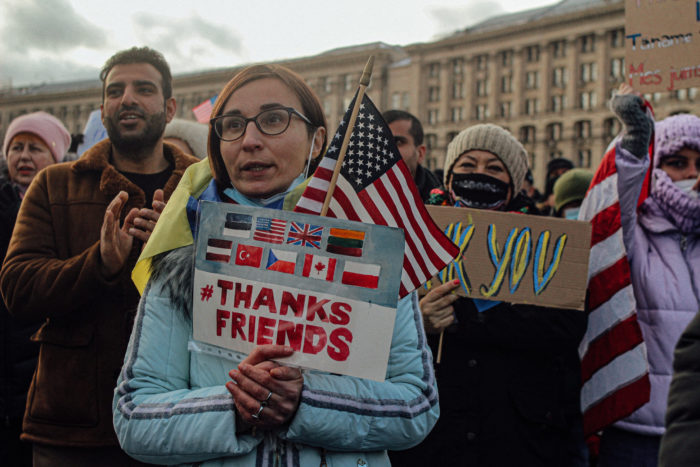An article titled Armed Nationalists in Ukraine Pose a Threat Not Just to Russia by Moscow-based Andrew E. Kramer appeared in The New York Times on February 10.
A very poorly done piece of reporting, it contains factual inaccuracies, seems to deny Ukrainians the right to assembly and self-expression, as well as the right to self-defense.

The inaccuracies seem to be intentional since they help blow out of proportion the point the article would probably even fail to make if the reporter had done his job.
The article is centered on the Democratic Axe – a minor political party that has been around since 2018. Its main goal is to decrease the role of government. It ran about a dozen candidates in the 2019 parliamentary elections and in the 2020 local election. Democratic Ax is a bunch of computer geeks who oppose the government and periodically stage small peaceful protests. Their popularity rating is close to zero but they do participate in various civic bodies that exercise government oversight. And they are NOT even close to being a nationalist paramilitary group.

There is no policy in Ukraine encouraging paramilitaries to arm, as the lead of the article would suggest. There is a policy aimed at forming and training territorial defense units to counter Russian aggression should a full-scale invasion take place. Although some paramilitaries may join and their groups could be strengthened as a result, arming them is NOT the government policy.
Also, before making this claim the author failed to check whether the government is taking any precautions against this development. Had he done that, maybe, there would have been no story?
How Ukraine is building its territorial defense: results of first month
Opposition to the settlement that Russia is trying to impose on Ukraine in the east (special status for the currently occupied territories) is NOT a fringe view. 56% of Ukrainians oppose it. And this is true for supporters of all political parties except one, including the ruling party.
Ukraine was forced to sign the Minsk deal following a military escalation caused by the Russian troops that crossed into the Ukrainian territory under the guise of pro-Russian separatists. Russia’s role in this hybrid conflict has been destructive from the start – sending its people and injecting propaganda into the situation which was already tense.
Now Russia is threatening even more military action to make Ukraine comply with Minsk’s unfavorable terms which moreover entrench the problem rather than provide a solution.
Three-fourths of Ukrainians oppose Minsk accords in current form, poll shows
The Capitulation Resistance Movement, another organization mentioned in the article, does not call for violent action, although they too oppose the government and the aforementioned settlement. However, the right to peaceful assembly and freedom of expression are guaranteed in any democracy and in the Ukrainian Constitution.

The only time violence is mentioned in the article is closer to the end where Yuriy Hudymenko of the Democratic Axe said that he would use his Kalashnikov against the government only if
government forces fire at peaceful protesters the way it happened back in 2014 at the end of the Revolution of Dignity.
The title of the article is beyond any decency let alone journalistic standards. People in Ukraine are arming to fight Russia in case it invades and moves to seize more territory and kill more people. So, is this the reason they pose a threat to Russia? No other reason why they could be a threat is given in the article.
[bctt tweet="The title of the article is beyond any decency let alone journalistic standards. Ukrainians are arming to fight Russia in case it invades and kills more people. So, is this the reason they pose a threat to Russia?" username="Euromaidanpress"]
Balanced reporting that stays true to facts is indispensable at the time of conflict. It’s needed even more when one of the parties to the conflict makes every effort to spread propaganda and to muddy the waters.
Everything you wanted to know about the Minsk peace deal, but were afraid to ask
And the New York Times article simply perpetuates them without much respect to what is actually happening on the ground.
No wonder Ukrainians start treating the once-respected media outlet as a piece of cheap pro-Russian propaganda.

Related:
- How Ukraine is building its territorial defense: results of first month
- Ukraine’s Territorial Defense volunteers prepare to support army in case of Russian invasion
- Ukraine now ready to fight Russia, “unlike 2014,” top brass says
- How prepared is Ukraine’s army to fight Russia in 2022?
- Three-fourths of Ukrainians oppose Minsk accords in current form, poll shows
- Leaked Kremlin emails show Minsk protocol designed as path to Ukraine’s capitulation – Euromaidan Press report
- Everything you wanted to know about the Minsk peace deal, but were afraid to ask

